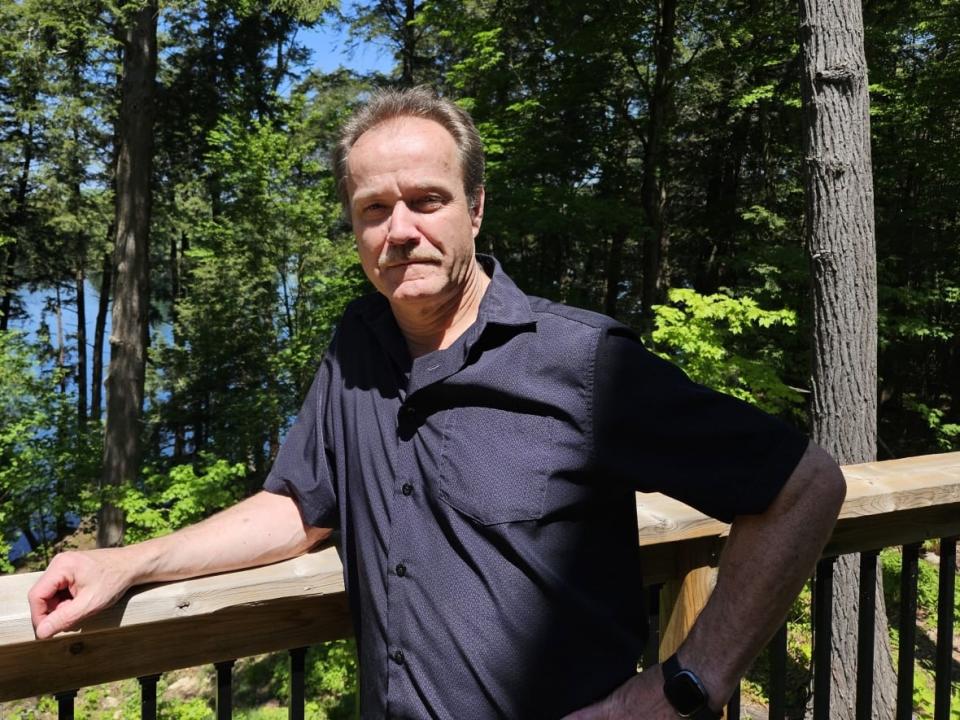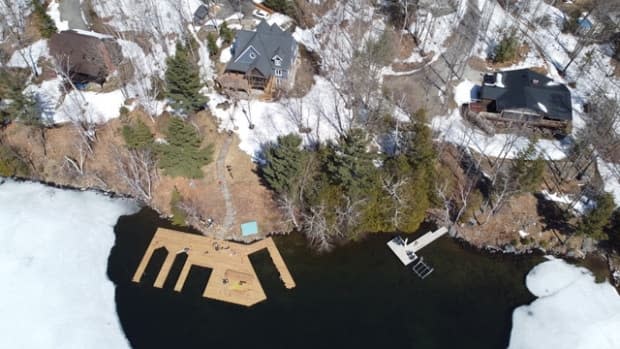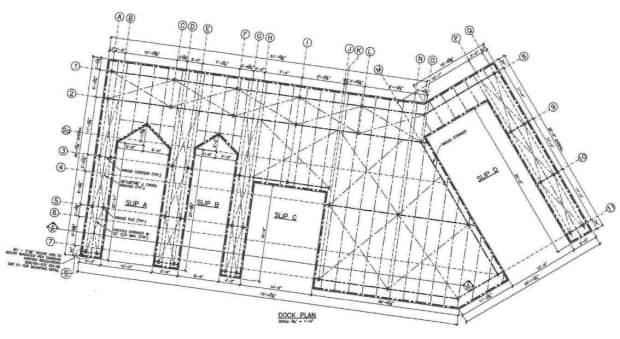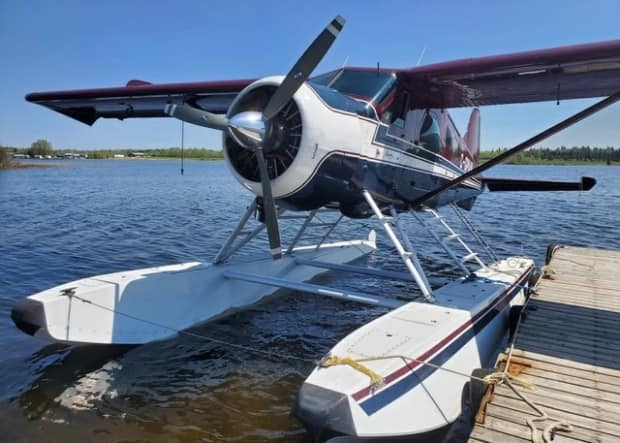'Mega dock' propels cottagers to seek new rules for aquatic airstrips

A large dock on a quiet Ontario lake has raised an uproar among local cottagers who say federal regulations for water airplane landing strips allow builders to ignore local bylaws.
Measuring more than 200 square metres — large enough to house a volleyball court — the dock sits on the shore of Three Mile Lake behind 206 Skyline Dr. in the Township of Armour, Ont., just north of Muskoka.
The property owner says the dock is part of a private water aerodrome — an aquatic landing strip for float planes and other aircraft — that falls exclusively under federal jurisdiction.
Nearby cottagers say the dock is a blatant attempt to skirt local zoning laws by operating under federal protection.
Township staff, in the minutes of a recent council meeting, simply say the structure is a "mega dock."
Three Mile Lake in the Township of Armour, Ont.
"It's steel construction, and it's mammoth," said Linda Newnham, acting president of the Three Mile Lake Community Club, which is "enraged."
"[It] has been perceived by the residents as an end-run to get what he [the owner] wanted."
The cottage association alleges the property owner is exploiting a "loophole" in Transport Canada regulations that allowed him to construct the dock without collaborating with local authorities.
The cottage association and township council are now pushing Transport Canada to crack down on similar proposals by ensuring mixed-use docks can no longer qualify as federally-regulated aerodromes.
Mayor worries about risk to lakes
Rod Ward, mayor of the Township of Armour, said the township's chief building officer first learned about the dock last December.
The building officer visited the property, Ward said, and was informed by the owner, Bruce Klassen, that his dock didn't need to follow the normal permitting process because it was registered with Transport Canada as a water aerodrome.

In a letter to the township's chief building inspector dated Jan. 10, 2023, Klassen's lawyer Matt Hodgson said the "design and dimensions" of the dock fall exclusively under federal jurisdiction.
Hodgson argued Canadian courts have repeatedly found that provincial laws and municipal bylaws do not apply to the location and establishment of aerodromes.
"The purpose of this letter is to avoid confrontation with municipal officials and pre-empt any misunderstanding with respect to construction of the dock on our client's lands," Hodgson wrote.
He said dock construction didn't need to meet local planning requirements nor did it require a permit under the township's site plan control bylaw.
According to Ward, Klassen began transporting building materials across the lake in mid-January.

Ward, who also owns a cottage on Three Mile Lake, said he was frustrated to learn Transport Canada could override the township's authority.
Township of Armour bylaws are designed to protect the region's lakes, Ward said, and those lakes may be put at risk if local rules aren't followed.
"In this area, our key resource is the lakes. It's the reason people come up here. It drives the economy," he said. "Protection of the lakes has always been critical."
When is a dock just a dock?
For Ward and other cottagers, the design of the dock suggests additional construction may be planned for the future. Ward said he's concerned Klassen could build on top of the dock, creating a boathouse or other structure, which could obstruct the view of neighbours.
"It wouldn't make a lot of sense to build this kind of foundation for something without building something on top," he said.
In an approval application submitted to the federal government's navigation protection program registry, plans for the dock do not include a roof.
Speaking via his lawyer in an email, Klassen said the plans do not contain elements of a boathouse because he has "absolutely no intention" of building one.
The plans do, however, show multiple spaces for boat slips alongside where a float plane would dock.

Township of Armour council passed a resolution at its May 2 meeting, which calls on Transport Canada to require anyone seeking to register a water aerodrome to consult provincial and municipal authorities before construction.
The resolution also called on Transport Canada to state "mixed-use" docks and structures, such as Klassen's, would not be permitted under its regulations.
The township has since passed a bylaw limiting the size of docks on the lake to about 45 square metres.
Klassen, a licensed pilot currently working for Air Canada, declined to comment further.
In a letter to Township of Armour council, Klassen said his dock was "specifically and purposely" designed to be used as a private water aerodrome.
Community opposition, he said in the letter, is based on a "lack of understanding, incomplete information and misinformation" about the project.
Klassen said the aerodrome will not be used for commercial purposes or fuelling aircraft, nor will it include a washroom or kitchen.
Recurring issue
Cottagers on Three Mile Lake aren't the first in Ontario to accuse a neighbour of using federal laws to dodge local authorities.
In a case heard by the Ontario Superior Court of Justice in 2013, an applicant in the District Municipality of Muskoka, Ont., was ordered to demolish a boathouse he built on Lake Rosseau, which he claimed was an aerodrome.
Unlike Klassen, the cottager in that case didn't hold a pilot's licence nor own a plane.
Gary Austin, who owns a cottage on Three Mile Lake and runs a small aviation business in London, Ont., said he has landed helicopters and float planes on the lake in the past.
Austin said people on the lake are welcoming to float planes, but he doesn't personally see a "practical use" for registering his dock as an aerodrome.

In his opinion, the only purpose of doing so would be to legitimize the aerodrome under the Aeronautics Act — thereby bringing the dock under federal authority.
"Why should I be special just because I own a float plane?" he said. "I think it would be prudent for Transport Canada to clarify those regulations … and make it very clear that if my dock is being used for mixed use, it doesn't qualify under that federal jurisdiction."
Unlike on land, where proponents are required to notify area residents before beginning construction, Transport Canada exempts water aerodromes from the consultation process.
In an email, a Transport Canada spokesperson said the department considers a "variety of factors" when considering whether regulations should be developed or amended, adding it would review the suggestions put forward by the Township of Armour.
The spokesperson also said the federal aeronautics regime does not absolve someone from following local bylaws, as long as those laws don't interfere with the functioning of a given aerodrome.
Transport Canada, however, puts the onus on the courts to decide whether a mixed-use dock is exempt from applicable bylaws on a case-by-case basis.
Newnham said that may download legal costs onto small municipalities.
"What we're saying to Transport Canada is 'you have caused the problem, but you're leaving it up to us — our time, our energy and our resources — to correct it,'" she said.
Local bylaws prevent 'wild west'
MP for Parry Sound–Muskoka Scott Aitchison said he believes Transport Canada is "absolutely" forcing municipalities into an unfair position.
"Frankly, it completely flies in the face of all the good work that municipalities are doing," Aitchison said.
"This is one of those clear examples of a different level of government overreaching with — I think — regulations that are too simplistic."

During his tenure as mayor in Huntsville, Ont., Aitchison said every year or two cottagers would try to flout local rules by registering their docks as private aerodromes.
Aitchison wants to see regulations ensure some degree of municipal involvement in the approval process. Cottagers shouldn't be able to "run roughshod" over local planning authorities, he said.
Terry Rees, executive director of the Federation of Ontario Cottagers' Associations, said an aerodrome loophole may jeopardize effective land use planning on lakes across the province.
"Those very specific rules [local bylaws] allow a community to ensure that it develops in an orderly fashion and that it's not the wild west," he said.
"We would like to make sure that loopholes like this are not used elsewhere."

